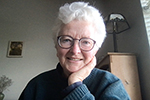 Poetry Editorial Board member and Book Reviews Editor Jay Ruzesky talks with the winter issue #225 contributor about the work of reading poems deeply, examining the roots and rhythms of language, and how metaphor focuses thought.
Poetry Editorial Board member and Book Reviews Editor Jay Ruzesky talks with the winter issue #225 contributor about the work of reading poems deeply, examining the roots and rhythms of language, and how metaphor focuses thought.
JR: Your last issue as editor of The Malahat Review was #145 (winter 2003). You’re still writing poetry and (surely) still reading it. Has what you now look for in the poems of others changed since you were selecting poems for the magazine?
MC:
I looked then for what I saw as freshness of vision and honesty of voice. I still do, but increasingly I return to the writing of those whose intent seems not to dazzle but to puzzle something out for themselves, so that the nuggets of witness and praise they leave us seem almost incidental. The new poems of John Steffler and Robert Hass got me through the winter, and the old poems of Seamus Heaney and Kate Barnes. And last week I discovered Kathleen Jamie and now want to read everything she’s written. One of the things I love in both reading and writing is how the very individual images and gestures of a poem can create a nexus that invites the unlikely reader in. For instance, you and I know the particular setting of “Mid-Spring,” but anyone who has experienced that open-doorway sensation, that alignment of field and season and active sky, no matter where or when, can step into it.
Read the rest of Marlene Cookshaw's interview.
Patrick Grace, Far Horizons Award for Poetry judge
 Screener Jeremy Audet talks with the Far Horizons Award for Poetry contest judge about uncommon diction, the importance of continuity, and turning inward to your own voice.
Screener Jeremy Audet talks with the Far Horizons Award for Poetry contest judge about uncommon diction, the importance of continuity, and turning inward to your own voice.
JA: What are you going to look for in a winning poem? What makes a winning poem stand out for you?
PG:
I want the winning poem to hit me in the gut from the first line in. With a 60-line limit for the Far Horizons contest, every word has to matter. Be meticulous, not spare. I’ll be looking for a poem that breaks my heart or makes it leap with joy, or wonder, or nostalgia. Send in strange and luminous poems. Take me to a moment in time, something you can’t forget. Tell me a story not often spoken. Make it gold. I love diction that’s uncommon but still accessible, the rare nouns and verbs that make me go Damn, I wish I’d written that.
Read the rest of Patrick Grace's interview.